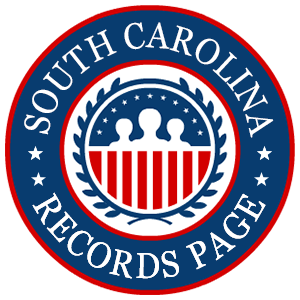Search free South Carolina public records in no time via the local, state, and federal agencies outlined in this brief resource. Find information on anyone’s person’s past or present — from arrests and convictions to court records and marriage details — all at no cost.
Accessing public records hosted by South Carolina government agencies is helpful to those seeking information about a person for personal or professional reasons. Knowing the basic steps of how to submit a free public record request in the state is key to a streamlined search, and this article empowers you with the tools and tips to do so.
South Carolina Public Record Requests
The South Carolina Freedom of Information Act states that the General Assembly of the state finds that any democratic society with public business should have its records open in a public manner so citizens can understand the decisions and performance of public officials.
Therefore, South Carolina makes it possible for citizens to find and learn information regrading the activities of public officials quickly and easily.
Furthermore, South Carolina declares that any person may request a public record without a specifying a reason why. However, the public is not able to access information about specific individuals or cases, such as pending investigation documents, confidential attorney communications, identification of classified information, bank transactions, and income tax returns.1
Some sites offer a search service to help users find information faster than manually searching through governmental resources since they compile records from across the nation into one area. However, using a free search service can sometimes return incomplete or inaccurate information.
If users are having trouble finding information quickly through local, state, and federal governmental resources, they can try using paid search services to return information quicker.
Before individuals can find public records in South Carolina, they should know the basic information of the person they are looking for, the jurisdiction in which the crime occurred, the type of records they need, and occasionally other important criteria like their date of birth.
Determining the type of record needed such as criminal records, court records, vital records, or inmate records can help searchers find information through the correct channels.
South Carolina Criminal Records
Criminal records contain the record of a person’s criminal history.2 This ‘rap sheet’ typically contains the following which gives the searcher a comprehensive photo of the individual’s past criminal history and personal identifiers:
- Sex
- Physical Description
- Fingerprints
- Mugshots
- Record of Past Arrests
- Record of Past or Current Warrants
- Charges
- Disposition
- Trial Court
- Subject’s Name
- Aliases
- Offense (felony vs. misdemeanor) 3
Criminal records provide information about a person’s background in terms of their past criminal history, data from trial courts, information from correctional facilities, and a rap sheet gathered by law enforcement agencies working in the local, city, county, and state jurisdictions within the state of South Carolina.
Helpful examples of how to request records at each of these levels are available below.
Who Has the Right To View SC Criminal Records?
Criminal records are considered public records due to the South Carolina Freedom of Information Act.
Any interested person, such as a curious individual or employer, can request the criminal history or rap sheet on an individual who has a history with law enforcement agencies in the state. The Law Enforcement Division maintains a central database that houses criminal records, but any interested person can access this information via their local county courthouses, sending in a mail-in request, or visiting the division in prison.
Individuals do not need consent for a statewide name-based case search, but consent is required for an FBI federal fingerprint-based check.
How To Obtain Criminal Records in South Carolina
There are usually two ways to obtain criminal records in South Carolina — online and offline methods.
Online: The fastest way to find criminal records on a person in South Carolina is to use the online method outlined below.
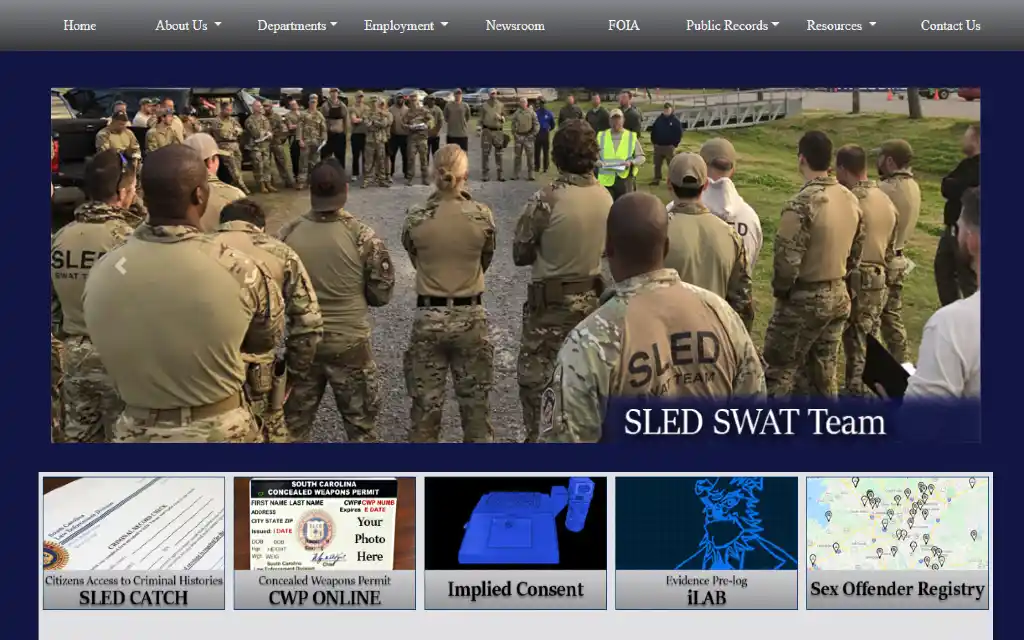
- Visit the South Carolina Law Enforcement Division
- Scroll to the bottom of the page
- Click on the Citizens Access to Criminal Histories portal (CATCH)
- Click on ‘I accept these terms and conditions’
- Click on ‘Not Eligible’ or ‘Eligible’ for the reduced fees (for charitable organizations)
- Enter the last name, first name, date of birth, gender, and/or SSN, maiden name of the subject and click ‘Submit’
- Click on ‘Make Payment’
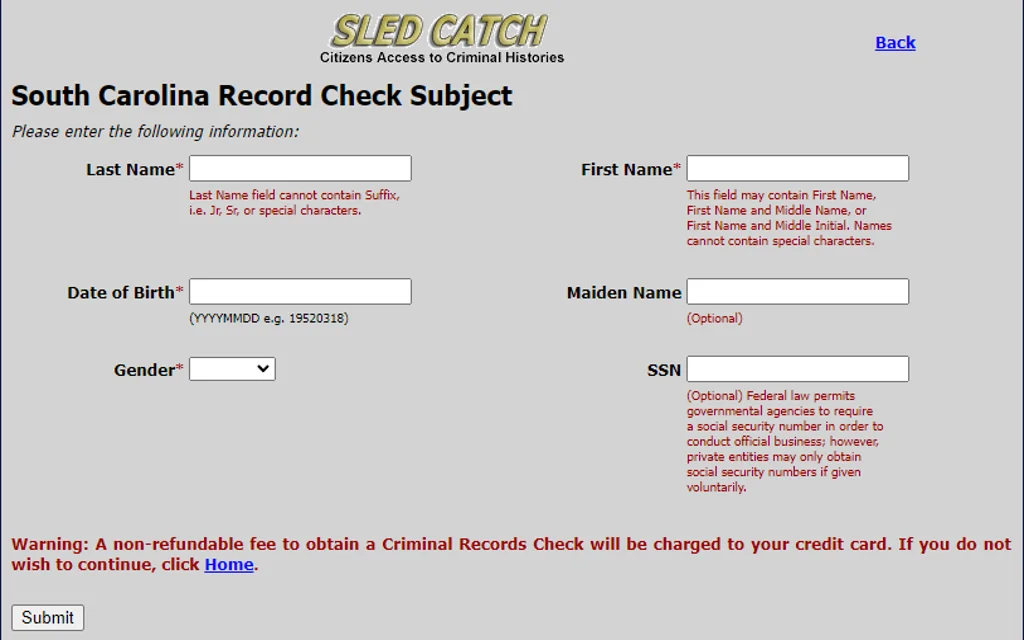
Offline: The other method that users can do to find a person’s criminal record is to use the criminal records form.
- Visit the South Carolina Law Enforcement Division
- Scroll to the bottom of the page
- Click on the Citizens Access to Criminal Histories portal (CATCH)
- Click on ‘Criminal Records Check Form’
- Fill out the full name, maiden name, DOB, Social Security number
- Include the $25 payment through certified check, cashier’s check, or money order payable to SLED
- Send the form and money to the following address:
State Law Enforcement Division
Records Department
PO Box 21398
Columbia, SC 29221
Furthermore, individuals can obtain criminal records on people in their home such as private or online tutors, house cleaners, pool guy’s etc.by using third-party search sites as long as it’s not for professional purposes.
Although searchers can usually find the information they are looking for through government sites, such as local and state-level websites, sometimes third-party search sites are quicker and search several counties and states at once. In this case, using a paid search site is one of many ways to find accurate information when the records can’t be found all in one place elsewhere.
South Carolina Juvenile Criminal History Details: Who Has Access?
Juvenile criminal records in South Carolina involve criminal activity committed by a minor who is under the legal adult age.
In South Carolina, juveniles are not considered to be adults convicted of the crime, but rather considered ‘adjudicated delinquents’. Therefore, juvenile records are NOT considered South Carolina public records.
Once a juvenile turns adult age, the records are not automatically erased or destroyed. In fact, the record remains unless the person then petitions to have their records expunged. Users will have to contact the South Carolina Department of Juvenile Justice to expunge a record.
How To See Who Has a Warrant (Check Anybody Wanted )
An arrest warrant in South Carolina is an official order by a court judge that states the local law enforcement agencies can detain, search, or arrest a person with sufficient evidence they have committed a crime or are connected with a crime. Generally, a warrant includes:
- Description of the Subject
- Reason for the Warrant
- Description of the Proposed Changes
- Date of the Warrant
- Name of the Judge
People who are interested in obtaining a warrant to search another person in South Carolina can do so by contacting the arresting agency. Warrants and docket information are public records in South Carolina. Therefore, individuals can contact the court website or the court clerk to find information on a specific person.
For example, if a person was arrested in Greenville County, individuals can do the following to find information on the person.
- Visit the Greenville County Clerk Court website
- Click on ‘Popular Services’
- Click on ‘Judicial’
- Click on Clerk of Court
- Use the contact information to email or call the office at 864-467-8551
Another method to find a person who has a warrant for their arrest is to use the local sheriff’s offices.
- Visit the South Carolina Sheriff’s Association website
- Click on ‘Directory’
- Use the county map to find the area in which the person may have a warrant
- For example, click on ‘Fairfield’
- Click on the link to go to the Fairfield Sheriff’s Office website
- Use the contact information to email or call the sheriff at 803-635-4141
An example of searching for local warrant information can be found by tracking down public records within Spartanburg County; contact details for the county clerk of court and sheriff’s office can be found here, along with custodians that host all other publicly available records in the county.
Some counties even have an online warrant lookup feature, such as the one provided in this resource on locating details of anybody wanted in Charleston County; on top of retrieving warrant details, citizens can find streamlined instructions for finding all other countywide public records–like arrests, criminal history reports, and court proceedings.
Lastly, a person can also check for a warrant through the South Carolina Department of Probation, Parole & Pardon services and browse the list of offenders currently in the area.
Find Nearby Sex Offenders in South Carolina
The South Carolina Sex Offender Registry is a statewide database of those who have been convicted of a sex crime in the state of Carolina. This registry is available for public viewing. Furthermore, Megan’s Law mandates that individuals convicted of a sex crime must register with the state to notify law enforcement, who can then notify the public.
- Visit the South Carolina State Law Enforcement Division Website
- Click on ‘Public Records’
- Click on ‘Sex Offender Registry’
- Click on ‘I Agree’
- Input information — Street, City, State, Zip Code and click ‘Search’
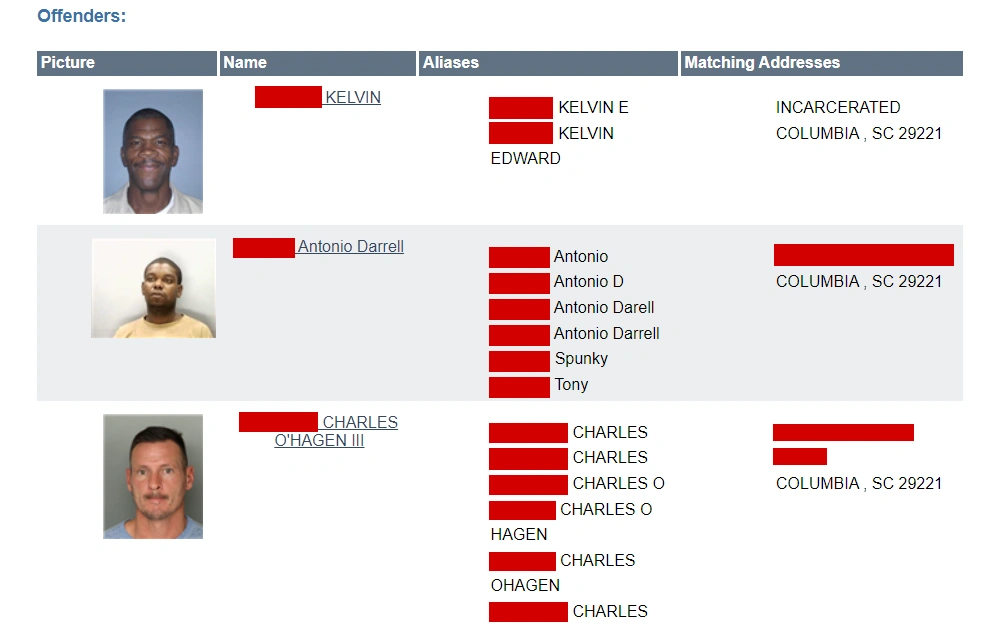
Individuals can also use the National Sex Offender Public Website (NSOPW) to find nationwide sex offenders.
- Visit the NSOPW website linked above
- Search by first name and last name or search by location
Using South Carolina’s state’s sex offender registry is easier for those who just know the county or city they wish to search. For the national registry, users must input a specific address or name to complete the search.
Running SC Background Checks
Searchers should look into the basics of how to perform background checks in South Carolina to see the most effective ways of using local, state, and nationwide government resources. Searchers need to typically decide between using a fingerprint or name-based background check based on their desired information.4
Name-Based Statewide Criminal Record Check — SLED CATCH & DSS Office of the Inspector General
One of the most common types of background checks performed in South Carolina is a state-level record check.
In South Carolina, criminal history is maintained unless they are expunged or sealed. The state businesses must not ask about expunged or sealed arrest records. Furthermore, South Carolina uses the Ban the Box law for public employees, preventing employers from asking about criminal history before the initial job interview and offer of employment.
The record checks on this website will contain important information, such as the following:
- Date of Birth
- Social Security Number
- Jurisdiction where the case was recorded
- Charge
- Fingerprints
- Felonies
- Warrant
- Arrests Records
- Addresses
- Aliases
- Drivers License Number
- Criminal Information
- Sentence5
Individuals can perform a criminal record check by filling out a request form and submitting it to the following address:
SLED Records Department
PO Box 21398
Columbia, SC 29221
Individuals can also do the same online by visiting the CATCH SLED website and doing a search online.
A criminal background check in South Carolina typically takes between 1-3 business days but can be faster depending on the database.6
Federal Fingerprint-Based Employment Background Check
The next type of background check is an employment-based background check that requires consent from the individual. Since this check requires fingerprints to be taken and submitted through an authorized US Post Office Location, the searcher or employer needs consent from the subject in question.
Background checks are processed through fingerprinting, the South Carolina Department of Public Safety, and the federal system. The employment background check typically takes between 2-5 business days to complete.7
Note, fingerprint background checks are also referred to as level 2 background checks and may be required for other instances such as purchasing a firearm.
Childcare Background Check (Employer for Specific Occupations)
The last type of background check in South Carolina is for specific occupations, such as those in childcare or healthcare. Individuals must obtain a state fingerprint-based background check by SLED to identify criminal history.
Furthermore, after completing the state check, they must undergo an FBI fingerprint-based background check and Central Registry Check by the National Crime Information Center.
SC Court Records
In South Carolina, there is a federal district court, state Supreme court, state court of appeals, and trial courts.8
- Supreme Court — jurisdiction over certain appeals, review decisions of the Court of Appeals, review post-conviction relief cases, original jurisdiction
- Court of Appeals — jurisdiction over appeals not within the jurisdiction of the Supreme Court
- Circuit Court — common pleas and general sessions
- Family Court — domestic and juvenile cases
- Magistrate Court — civil cases up to $7.5K, criminal cases up to 30 days or $500
- Municipal Court — criminal asset by statute, municipal ordinances, traffic offenses
- Probate Court — administration of estates, guardianship and conservatorship cases, mental and substance abuse cases, minor settlements9
Check Various Court Records & Proceedings in South Carolina
Court records in SC are public records that can be accessed based on the South Carolina Freedom of Information Act and using the following form. Court records are open to any member of the public to make copies, except for when a record is expunged or redacted for legal reasons.
Individuals can find court records in South Carolina by choosing the specific courthouse location.10 Searchers should find the specific court and contact the Clerk of Courts to access paper or electronic records. This can be done online or in-person by visiting the courthouse at one of the locations from the online directory.
Citizens can also review this tutorial on acquiring Darlington County public information to see specific examples of how to access local court records, as well as plenty of other county public records pertaining to marriage, arrests, property, and more.
Lastly, individuals can use the South Carolina Judicial Branch website to find information regarding court records.
- Visit the SC Judicial Branch site or the SC Public Index
- Click on ‘Case Records Search’
- Click on the county where the record originated
View Anyone’s Bankruptcy Records in South Carolina
Bankruptcy records in South Carolina include information on an individual who is not able to pay back debts to creditors. This information contains information on student loans, gourmet loans, bank loans, or files for bankruptcy.
South Carolina bankruptcy records contain the following:
- Taxable income
- Assets
- List of creditors and amount owed
- List of employees
- Case status and disposition
According to the state’s Freedom of Information Act, bankruptcy information in South Carolina are public files. However, sealed bankruptcy records are not available to the public.
The quickest way to obtain bankruptcy records is to use one of the following online methods:
- CM/ECF — Register for the Case Management/Electronic Case Files system that provides 24/7 access to files
- VCIS — Use the Voice Case Information System and call 866-222-8029 to find information
- PACER — Use the Public Access to Court Electronic Records (PACER) system to find bankruptcy records
- Archives — Closed bankruptcy cases can be accessed through the National Archives Records Administration (NARA).
Look Up SC Inmate Information
Inmate records in South Carolina contain information regarding a person’s inmate status.
The South Carolina Department of Corrections contains an online system that houses all statewide prison records, including incarceration dates, offenses, names, expected release, and probation information. Police departments and sheriff’s offices contain information about those incarcerated in statewide jails.
This information is helpful to those who wish to contact an inmate, find out release date information, or send packages to an inmate.
Find Details About Somebody in a South Carolina Jail
The best way to find jail inmates and South Carolina arrest records for free is to first determine if the person is in a county, city, or regional jail.
- County Jails — County jails are run by the state’s sheriff’s offices. The fastest way to find an individual is to see where they were arrested and contact the local sheriff’s office. For example, searchers can visit the Greenville County Sheriff’s Office website and use the contact information to send a message, call the front desk at 864-467-5300, or file a criminal report.
For a full list of county jail inmate or arrest logs, take a look at the free South Carolina arrest and criminal records lookup guide.
- City jails — City jails are run by the local police departments. For example, the Charleston Police Department website offers ‘Freedom of Information Act Request’ that allows searchers to file requests for the Charleston Police Department. Users can also use the contact information on the police department’s website.
- If searchers cannot find police record information through a police department, they can use VINELink.
How Do I View Mugshots in South Carolina?
The quickest way to find someone’s mugshot in Vermont is to determine where the individual has been arrested by using the previous steps. Once a person knows where they might be housed, they can look up the respective jail’s online website or social media account to find mugshot photos.
For example, Georgetown County Sheriff’s Office offers a Bookings & Release section that shows recent mugshots.
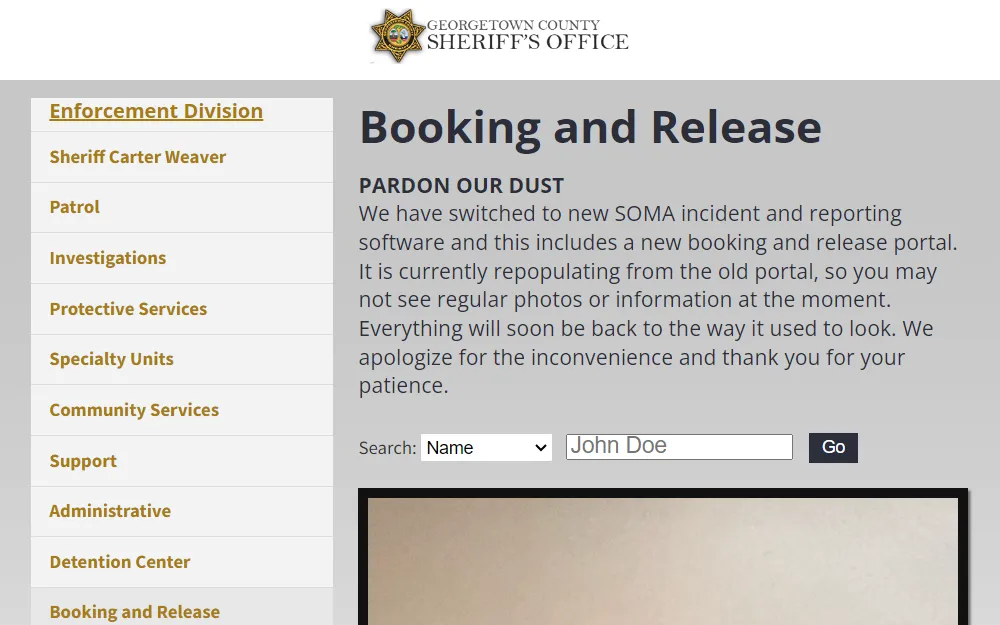
If users cannot find a person’s mugshot or recent arrests on a county sheriff’s website, they can use a paid third-party search site to return the results.
Find Records of State & Federal Prisoners: South Carolina
The quickest way to find a prisoner in South Carolina is to do the following:
- Federal inmates — Use the Bureau of Prisons’ Find an Inmate’ locator to search by name or number
- State inmates — The South Carolina Department of Corrections offers Inmate Locator Tool to search for individuals under custody.
South Carolina Vital Records: Overview
Vital records are life events that are kept secure by a governmental authority, such as birth certificates, death certificates, marriage licenses, and divorce records. Users can access vital records by sending in a request to one of the Vital Records Office locations, using online resources, or visiting the office in person.
Can Everyone Access Free Vital Records in South Carolina?
The Division of Vital Records at the SEC’s Office of Public Health Statistics houses vital records for the public. South Carolina law requires that only certain persons can obtain copies of vital records certificates.
How To Check Marriage & Divorce Records in SC at No Cost
Searchers can request a copy of a marriage certificate through various methods:
- VitalChek – Record requests cost $25.75.
- In-person ($12) at the following address:
DHEC State Vital Records Office
2600 Bull St.
Columbia, SC 29201
- By mail — completed Vital Records Application Form, $12 fee, government ID, and mail to the aforementioned address11
- Drop-off — application, $12 fee, and ID to the aforementioned address
The only people who can access a marriage certificate copy are the subject, the married party’s children, present or former spouse, or the married party’s legal representative.
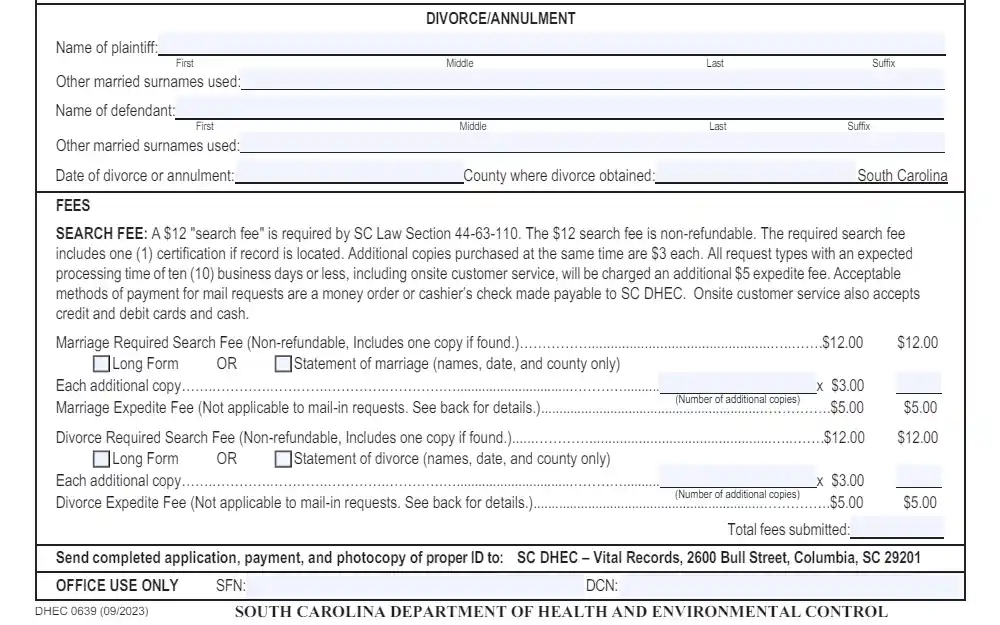
Divorce information in South Carolina has slightly different limitations where the only people who can obtain a divorce report are the subjects (ex husband and wife), adult children of the divorced parties, and present or former spouses.
While there are some limitations, the graph created from US Census Bureau data shows the divorce rate, or percentage of divorced individuals in each South Carolina county:
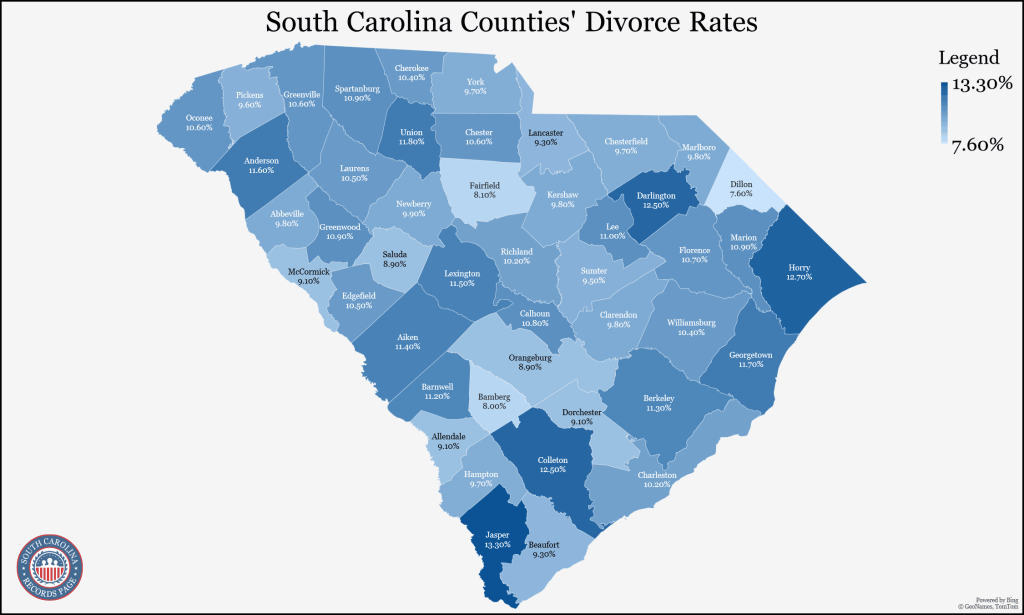
Obtain a New Death or Birth Certificate in South Carolina
Searchers can obtain a new birth certificate if they are the subject of the certificate, the parent of the subject, or the legal guardian. The quickest way to obtain a copy is to do one of the following:
- Online – VitalChek ($25.75 for both) or GoCertificates ($25.70 for both and $3 for additional copies)
- Phone – Call VitalChek at 877-284-1008 $25.75
- In-person – DHEC State Vital Records Office or one of the Regional Vital Offices $12
- By mail — Send an application form to the DHEC Vital Records Office $12
- Drop-off — In-person to the DHEC Office $12
Searchers can obtain a death certificate if they are an immediate family member of the deceased’s family or a legal representative. Individuals can use the aforementioned steps to request a copy of a South Carolina death certificate, but use the death certificate application form instead.
This article serves as a valuable tool for anyone looking to access South Carolina public records, simplifying the process and ensuring that individuals can locate and retrieve the necessary documents efficiently.
References
1South Carolina FOIA Laws.(n.d.). National Freedom of Information Coalition. Retrieved June 1, 2022, from <https://www.nfoic.org/south-carolina-foia-laws/#:~:text=Anyone%20may%20request%20public%20records,employee%20information%20for%20commercial%20purposes.>
2Criminal Record. (2022, 28 May). Wikipedia. Retrieved from <https://en.wikipedia.org/wiki/Criminal_record>
3Information about Criminal Records. (n.d.). Legal Aid at Work. Retrieved June 2, 2022, from <https://legalaidatwork.org/factsheet/records/#>
4Do I Need to Use a Fingerprint or Name-Based Background Check? (2018). Trusted Employees. Retrieved June 1, 2022, from <https://www.trustedemployees.com/learning-center/articles-news/do-i-need-to-use-a-fingerprint-or-name-based-background-check/>
5South Carolina State Background Check. (n.d.). BackgroundChecks. Retrieved June 1, 2022, from <https://www.backgroundchecks.com/our-data/coverage-map/south-carolina-state-background-check>
6Korolevich, S. (2021, February 10). How Long Does A Background Check Take? GoodHire. Retrieved May 28, 2022, from <https://www.goodhire.com/blog/how-long-do-background-checks-take/>
7How Long Do Pre-Employment Background Checks Take? (2021). Indeed. Retrieved from <https://www.indeed.com/career-advice/career-development/how-long-do-a-background-check-take-for-a-job#>
8Courts in South Carolina. (n.d.). Ballotpedia. Retrieved June 1, 2022, from <https://ballotpedia.org/Courts_in_South_Carolina>
9Circuit Riders: South Carolina Case Law. (n.d.). University of South Carolina School of Law. Retrieved June 1, 2022, from <https://guides.law.sc.edu/c.php?g=315482&p=2108374>
10List of county courthouses in South Carolina. (2022, 24 May). Wikipedia. Retrieved June 2, 2022, from <https://en.wikipedia.org/wiki/Vital_record>
11South Carolina Department of Health and Environmental Control. Accessed 26 April 2024. <https://scdhec.gov/sites/default/files/Library/D-0639.pdf>
12South Carolina Law Enforcement Division. Accessed 6 May 2023. <https://catch.sled.sc.gov/>
13South Carolina State Law Enforcement Division. Accessed 26 April 2024. <https://scor.sled.sc.gov/GeographicalSearch.aspx>
14Georgetown County Sheriff’s Office. Accessed 6 May 2023. <https://www.gcsheriff.org/enforcement-division/booking-and-release/>
15SCDHEC. Accessed 6 May 2023. <https://scdhec.gov/vital-records/office-locations>
